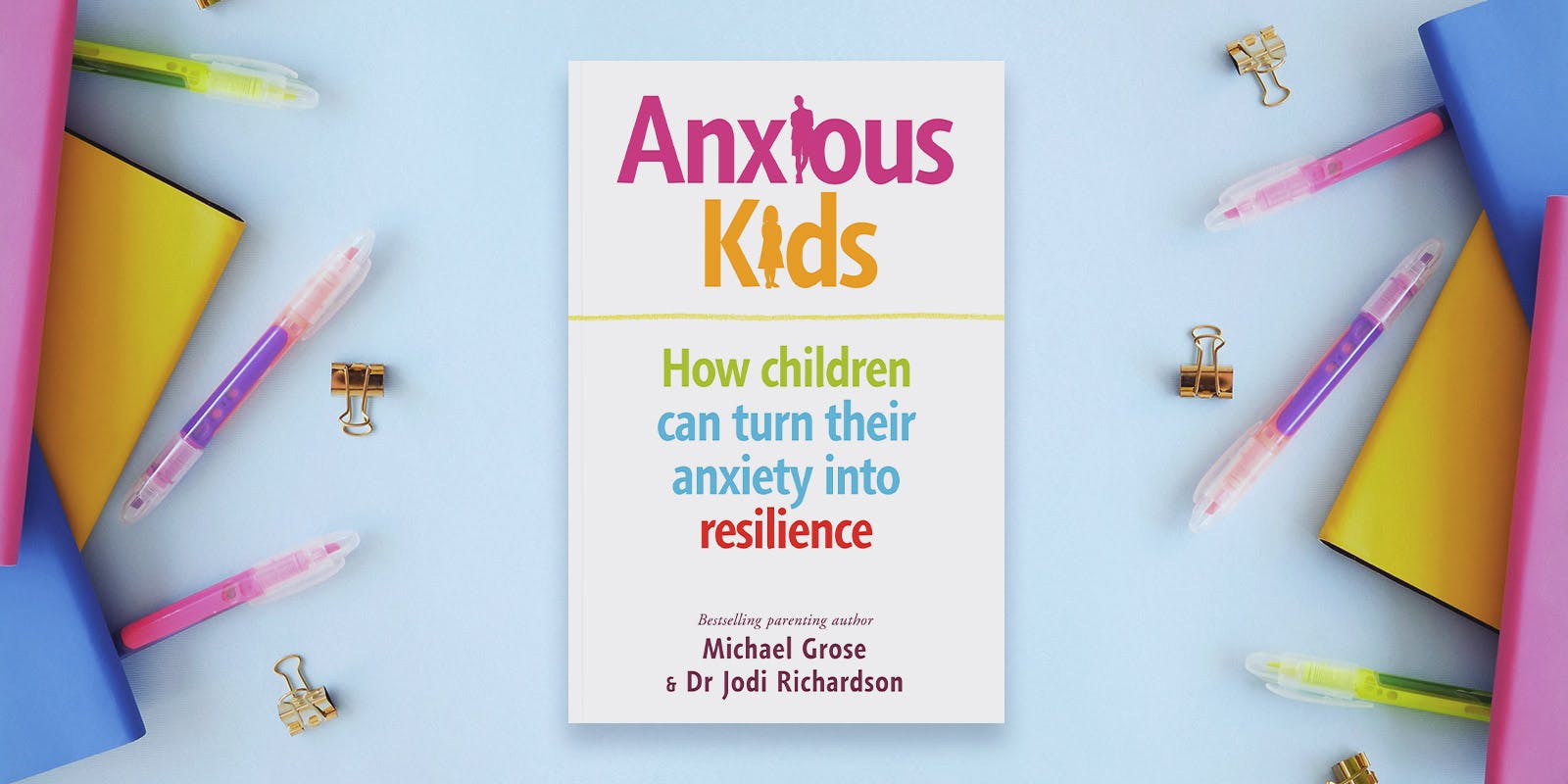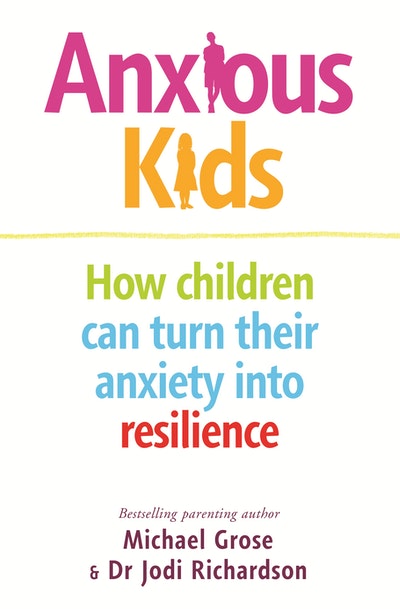Anxious Kids coauthor Dr Jodi Richardson on how parents can help their kids manage COVID-19 anxiety.
Anxiety levels are high for everyone at the moment. For us, as adults and as parents, it’s a time of unprecedented uncertainty. The ripple effect of the impacts of COVID-19 – from closures to product availability, travel bans, income, loved ones, connection, work, businesses, politics, healthcare and mental health (to name a handful) – will affect all of us in some way for the foreseeable future. Anxiety is our brain and body’s reaction to anticipated threat, so it’s natural for it to be affecting each and every one of us in some way at the moment.
What we as adults have at our disposal, and what our kids lack, is the ability to maintain perspective on the news. We can seek out trusted information to help us understand the facts so we’re less affected by inflammatory media. Our kids are hearing us talk about it, they’re seeing spare rooms filled with toilet rolls, they’re watching class numbers diminish or are staying home from school. They’re seeing snippets of the news or even regular news updates and they’re talking about it with their friends in class. One primary school reported a new game where kids had to play dead if they got tagged in a game called coronavirus. For children who do go looking for answers, they’re likely to stumble across media that could amplify their anxiety rather than help to settle it down.
There’s a lot we can do as parents to help our kids through such a difficult time, here are some important ways you can help them:
Manage your own anxiety
Understand that anxiety is contagious too. Our kids are looking to us and how we are responding, we need to be mindful of what we say and do in front of our kids at the moment. If you’re struggling with your own anxiety and mental health right now, maintain your usual coping strategies and add in more. Do you need distraction or self-soothing? Write yourself out a list of ideas to help you to manage your mental health. Connect with the people that can support you too. Avoid panicking when your kids are around but please make sure you’re being supported to cope.
Start with what your child already knows
Start where your kids are at when it comes to discussing the virus. If they’re under six and know nothing of the virus, leave it that way for now. Of course, if they have questions answer honestly but don’t give them more than they’re asking for. For kids that do know about the virus some will have heard tales of death and panic while others might be curious to know why their favourite flavour of baked beans isn’t in the pantry. Find out what they know and give honest responses that are age-appropriate. Above all, don’t be afraid to talk about it, they’ll worry more when their ‘what ifs’ are left unanswered.
Validate how they feel
When we’re anxious or fearful there’s nothing worse than when someone says ‘don’t worry’ or ‘no need to be upset’. What we all need, and especially our kids, is for someone to say, ‘I get it’, ‘I understand this is hard for you right now’ or ‘I’ve felt like that too, not much fun, eh?’. Empathy is so important for us to share with each other right now but especially with our anxious kids. What naturally follows after empathy is compassion, a warm and nurturing response to the suffering our children are experiencing. We know this helps our kids to cope much better when facing challenges, it shows them we see them, we hear them and we’re here for them.
Help your children to remain present
Anxiety builds when we’re future-focussed and worrying about all of the ‘what ifs’. By helping our kids remain focussed in the present we’re bringing their minds back to a place of calm amidst the storm. Playing games, doing crosswords, dancing to music, learning something new, solving puzzles, being creative. All of these bring future-focussed worried minds back to the here and now.
Progressive relaxation
When we’re anxious our bodies tense up. It’s because our muscles are primed and ready for us to fight or flee imminent danger. Yet, because the danger is psychological, we don’t move, the tension builds and awful anxious feelings hang around much longer than they would if we used relaxation strategies. Progressive relaxation is a series of movements we can take our children through. I often teach progressive relaxation from the toes to the nose. You can start by asking your child(ren) to lie down on the floor, eyes closed and ears open. Ask them to start by curling their toes to tighten the muscles and joints, next they let their toes relax and notice how different that part of the body feels. The pre-tension amplifies the relaxation that follows. Continue with tension and relaxation slowly up the body and get creative. By the time you ask them to shrug their shoulders you might get them to picture being a turtle pulling its head back into its shell. There are some wonderful online progressive relaxation audio tracks. We really like this one in our family.
Mindfulness
I wrote earlier about the importance of being present, it’s a balm for an anxious mind but it’s also a skill to learn. When we put our attention in the present moment it will readily drift back to other things we have on our mind. The objective of mindfulness is not to empty your mind or to expect to remain present every single moment, it’s about purposefully paying attention to the present moment, noticing when your mind has wandered, thanking your mind for doing what minds do, and then returning your attention back to the mindfulness exercise. This will happen again and again and again. Over time and with practice, wandering thoughts become less sticky and our minds wander less to begin with. It’s a skill that can bring our children a sense of calm, relaxation, contentment and equanimity. Since mindfulness is about paying attention on purpose the ways you can introduce it are endless. You might start by asking your child(ren) to lie down and close their eyes, paying attention to all they can hear for a minute or two. Start with short mindfulness exercises and increase the length of the exercises over time. There are some great apps to help you, try Smiling Mind, Headspace for Kids and Calm. Mindfulness practised regularly over time reduces the reactivity of our brain's alarm system, reducing stress and anxiety.
Breathing
The part of the brain that sounds the alarm when danger is detected is called the amygdala. One of the tangible ways we can show our brain we’re safe is through deliberate breathing using our diaphragm. Breathing is a powerful antidote to anxiety, helping us to shift control of our physiology from the predominant ‘fight or flight’ branch of the nervous system to the ‘rest and digest’ branch that enables us to think more clearly and feel more calm and centred. What you’ll find is that the mindfulness apps I suggested above have wonderful guided breathing mindfulness exercises that combine the power of mindfulness and breathing in one. It’s no coincidence that often our first advice to anyone feeling highly stressed or anxious is to take a deep breath.
Sending huge virtual hugs to each and every one of you. Take care and stay connected to your loved ones, to each other and to the people in your community. Tough times do pass, this is no different.
Jodi x
This article was previously published on https://drjodirichardson.com.au/.













